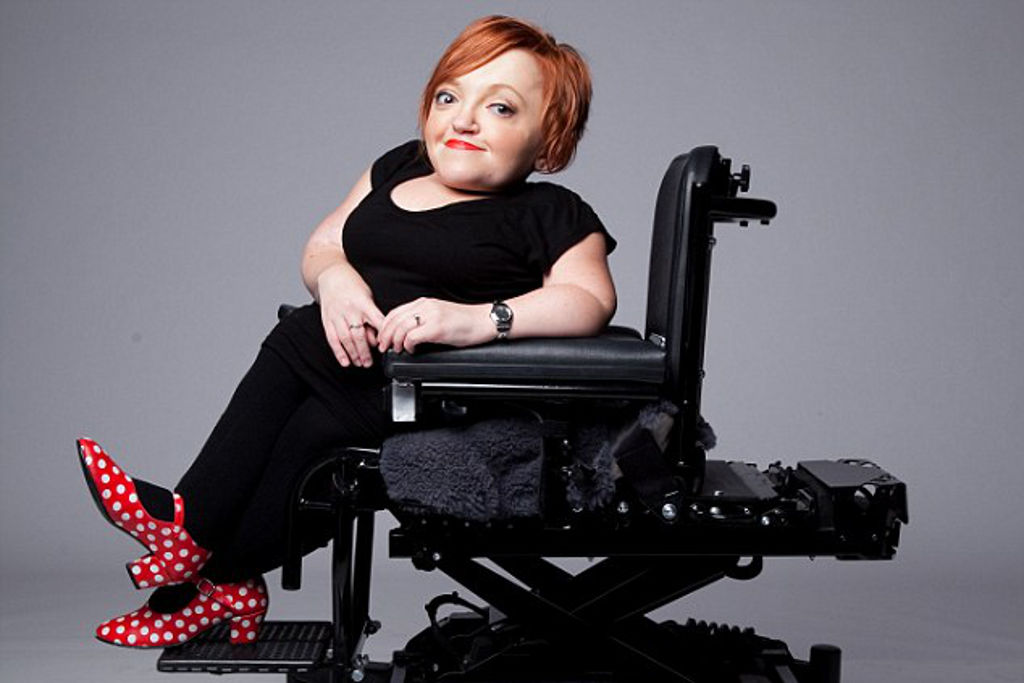Why Stella Young Was So Important For Australia
A fierce activist. A brilliant writer. Funny as hell. “Disability doesn’t make you exceptional," she said, "but questioning what you think you know about it does.”

On Saturday night, writer, comedian and activist Stella Young passed away.
Today, many have praised Stella for her advocacy of Australians with disabilities, which was important. But that wasn’t all that Stella was. She was a fierce activist for women’s rights and for LGBT equality; more generally, she was an advocate for an Australia that looked after the interests of all Australians. She was also only 32 which, given her public profile and impact, seems unbelievable.
You may have known her from being bloody funny on stage, funny on Twitter or recognised her byline on Mamamia, The Punch, The Drum or as the editor of Ramp Up. She was a two-time runner-up in Melbourne International Comedy Festival’s Raw Comedy competition, and frequently appeared on programs like Four Corners AND Q&A — again, being bloody funny, but also resolute in her views about disability issues.
It’s not often that a comedian doesn’t sacrifice their beliefs and politics for the sake of appearing commercially viable. Stella’s edge was that she gave literally zero fucks about making herself more accessible to bozos. And that’s why people loved her so much.
Stella was sharp in her writing and incredibly perceptive. In her last editorial for ABC’s Ramp Up, she discussed how dancing on a night out had become a political act for her, confronting expectations about the behavior of disabled people, and linking it to a wider discussion of surveillance and female bodies. “I subvert expectations. It is not always my intention – living your life with the express purpose to challenge people is exhausting – but I have learnt that it’s a consequence of doing what I want to do,” she writes. “To live unapologetically in a body you’re consistently told you should be ashamed of is a political act.”
The majority of Stella’s written work was centered on issues to do with disability; she engaged with ideas that were perceived as too risky or taboo for other writers to touch. “I dearly hope that future awards for the world’s most liveable city will encapsulate liveability for all, not just those who like their artisan coffee and cobbled laneways,” she wrote on The Drum, about Melbourne’s absence of accessible venues. “Who is and isn’t allowed to use disabled toilets is an age-old and frankly boring question. People who don’t look disabled need to use accessible toilets for all kinds of reasons. Shit’s complex. Literally,” she said on Mamamia, about the lack of disabled toilets in the city.
Stella was a champion of non-normative communities, and a critic of the frameworks that exploit them; she was also an ambassador for Our Watch, and a member of various boards and committees in the disability sector. She was not always unanimously praised – her use of the word “crip”, in an effort to reclaim it, often caused controversy – but universal admiration was never her goal. By now, you’ve probably watched Stella Young’s TEDx Sydney talk from April this year. If not, it’s worth the ten minutes.
Whether or not you or someone you know is living with a disability, this speech is important. It’s important because it challenges the patronising language often used to describe anyone of difference; it’s important because it interrogates the assumptions that everyone — even those who see themselves as advocates for marginalised groups — falls victim to. I met my best friend on the first day of Year 7, which was also the day our homeroom teacher made her stand up in front of the class and explain that she had albinism. Our teacher probably thought it would be empowering, but looking back it seemed like she was just marking her as different from day one. I had forgotten about that day until I saw Stella’s speech. (Interestingly, Stella and my pal went on to be mates later on).
Stella didn’t see her diagnosis of Osteogenesis imperfecta as reason enough for her to receive awards, and she was not willing to be a source of inspiration if it meant objectifying her diagnosis for the benefit of someone else. “I want to live in a world where we don’t have such low expectations of disabled people, that we are congratulated for getting out of bed and remember our name in the morning,” she said in her TEDx talk. “Disability doesn’t make you exceptional, but questioning what you think you know about it does.”
Vale Stella Young. I hope the big guy upstairs has worked out his accessibility ramps – otherwise there will be hell to pay.
–
If you would like to make a donation in honor of Stella Young, her family are pointing people towards Domestic Violence Victoria.
–
Sinead Stubbins is a writer from Melbourne. She tweets from @sineadstubbins